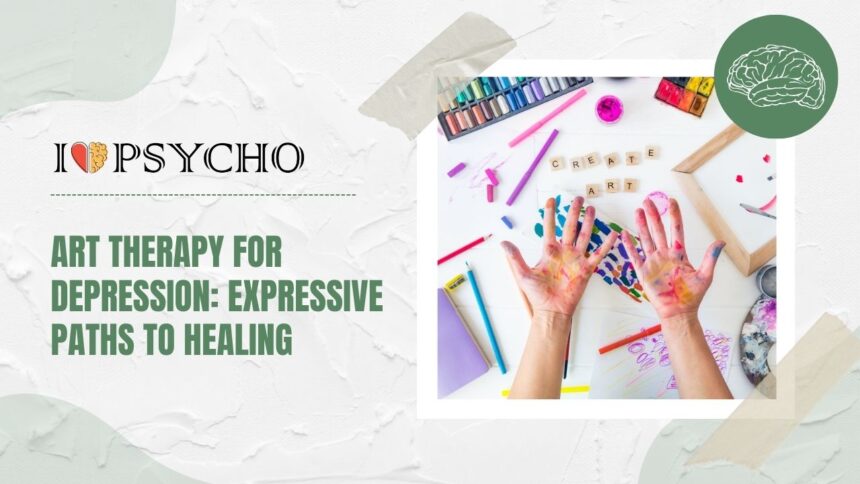Welcome to a world where colors and creativity intertwine to form a canvas of healing and hope. In the midst of the stormy seas of depression, art therapy shines as a beacon of light, offering expressive paths to inner peace and restoration. Join us on this journey as we explore how art therapy can unlock doors to emotional well-being and transform darkness into beauty.
Understanding Depression and its Effects
Depression is more than just feeling sad or blue; it’s a complex mental health condition that can affect every aspect of a person’s life. It goes beyond temporary feelings of low mood and can linger for weeks, months, or even years. The impact of depression extends far beyond emotional distress – it can disrupt sleep patterns, appetite, energy levels, and overall motivation.
Individuals battling depression may experience feelings of hopelessness, numbness, and worthlessness. Simple tasks become overwhelming challenges as the weight of sadness clouds their thoughts. Relationships may suffer as social interactions feel draining and isolating.
Physical symptoms such as headaches, body aches, and digestive issues often accompany the emotional turmoil of depression. The invisible battle taking place within can be exhausting and debilitating. Understanding the multifaceted nature of depression is crucial in navigating its complexities with empathy and compassion towards oneself or others experiencing it.
What is Art Therapy?
Art therapy is a form of mental health treatment that utilizes the creative process of making art to improve a person’s physical, mental, and emotional well-being. It allows individuals to explore their thoughts and feelings through various artistic mediums such as painting, drawing, sculpting, or collage-making.
Unlike traditional talk therapy, art therapy taps into the subconscious mind by providing a non-verbal outlet for self-expression. This can be particularly beneficial for those who struggle to articulate their emotions verbally or feel overwhelmed by traditional forms of communication.
Through engaging in the art-making process guided by a trained therapist, individuals can gain insights into their inner world and develop coping strategies for managing stressors and challenges they may face. Moreover, creating art can help boost self-esteem, enhance problem-solving skills, and foster a sense of accomplishment and empowerment.
Art therapy offers a unique avenue for individuals to connect with themselves on a deeper level and embark on a journey towards healing and self-discovery.
How Does Art Therapy Help with Depression?
Art therapy offers a unique and creative approach to helping individuals navigate the complex landscape of depression. Through artistic expression, individuals can explore their emotions, thoughts, and experiences in a non-verbal way that traditional talk therapy may not always capture.
Engaging in art-making can act as a form of release, allowing suppressed feelings to surface and be processed in a safe environment. This process can provide insights into one’s inner world and help make sense of confusing or overwhelming emotions.
Furthermore, art therapy promotes mindfulness and presence as individuals focus on the creative process at hand. This can help alleviate symptoms of depression by shifting the focus away from rumination on negative thoughts towards positive self-expression.
In addition, art therapy fosters self-discovery and empowerment as individuals gain confidence in expressing themselves through various artistic mediums. This newfound sense of agency can contribute to improved self-esteem and overall well-being for those struggling with depression.
Different Forms of Art Therapy for Depression
Art therapy for depression comes in various forms, offering individuals a range of expressive paths to healing. One form involves using colors and shapes to explore emotions through painting or drawing. This visual expression can help individuals process complex feelings and experiences that are difficult to put into words.
Another form of art therapy includes creating collages or vision boards, where individuals can visually represent their hopes, dreams, and aspirations. This process allows them to focus on positive imagery and manifest their desires for the future.
Sculpture or pottery can also be therapeutic, as the tactile experience of molding clay or shaping objects with one’s hands can be incredibly grounding and soothing. It provides a physical outlet for releasing pent-up emotions and stress.
Furthermore, engaging in music or dance therapy offers a different avenue for self-expression and emotional release. Moving to music can help individuals connect with their bodies and release tension stored within them.
Success Stories: Real-Life Examples of Art Therapy’s Benefits
Imagine a young woman struggling with debilitating depression, feeling lost in a sea of darkness. Through art therapy, she found solace in expressing her emotions through painting and drawing. Each stroke of the brush became a release, a cathartic journey towards healing.
In another instance, a middle-aged man grappling with anxiety and low self-esteem discovered the power of sculpting as a form of art therapy. Molded clay transformed his inner turmoil into tangible creations, giving him a sense of control and empowerment over his emotions.
These real-life examples showcase the transformative impact that art therapy can have on individuals facing mental health challenges. It goes beyond words or traditional forms of therapy, tapping into the creative essence within us all to facilitate healing and growth. Art becomes not just an outlet but also a mirror reflecting our innermost struggles and triumphs.
Tips for Incorporating Art Therapy into Your Life
Looking to incorporate art therapy into your life? Here are some tips to help you get started. Begin by setting aside dedicated time each week for creative expression. Whether it’s painting, drawing, or sculpting, make it a priority and commit to regular sessions.
Create a comfortable and inspiring space where you can freely explore your emotions through art. Surround yourself with materials that resonate with you and allow yourself the freedom to experiment without judgment.
Experiment with different mediums and techniques to discover what resonates most with you. Don’t be afraid to step out of your comfort zone and try new things – art therapy is all about exploring creativity in a safe environment.
Consider joining an art therapy group or finding a therapist who specializes in this modality. Connecting with others who share similar experiences can provide valuable support and inspiration on your healing journey.
Remember that there is no right or wrong way to engage in art therapy – the process is about self-discovery and personal growth. Embrace each session as an opportunity for reflection, healing, and transformation through artistic expression.
The Future of Art Therapy in Mental Health Treatment
As we look ahead to the future of mental health treatment, it’s clear that art therapy is gaining recognition for its effectiveness in supporting individuals with depression. Advances in technology have opened up new possibilities for integrating art therapy into virtual platforms, making it more accessible to a wider audience.
With ongoing research and studies highlighting the positive impact of art therapy on mental well-being, we can expect to see an increase in its integration into traditional therapeutic practices. The acceptance and validation of using creative expression as a tool for healing will continue to grow, leading to more widespread adoption by healthcare professionals.
Art therapy has the potential to evolve further with innovative techniques and approaches tailored to meet the diverse needs of individuals struggling with depression. As society becomes more aware of the holistic benefits of incorporating art into mental health care, we anticipate continued growth and development in this field.
The future holds promising opportunities for expanding the reach and effectiveness of art therapy as a valuable resource in promoting emotional healing and well-being.
Conclusion
Art therapy offers a unique and powerful way to navigate the challenges of depression. By tapping into the expressive and creative aspects of oneself, individuals can find healing and relief in ways that traditional talk therapy may not provide. Through various forms of artistic expression, from painting to sculpting to writing, art therapy allows individuals to explore their emotions, process their thoughts, and gain valuable insights into themselves.
As we look towards the future of mental health treatment, it’s clear that art therapy will continue to play a significant role in helping individuals overcome depression and other mental health issues. The power of creativity combined with therapeutic support has shown time and time again to be a transformative tool for those struggling with emotional distress.
So whether you’re picking up a paintbrush for the first time or revisiting an old passion for drawing, consider incorporating art therapy into your self-care routine. Embrace the healing potential of artistic expression as you embark on your journey towards greater emotional well-being.









